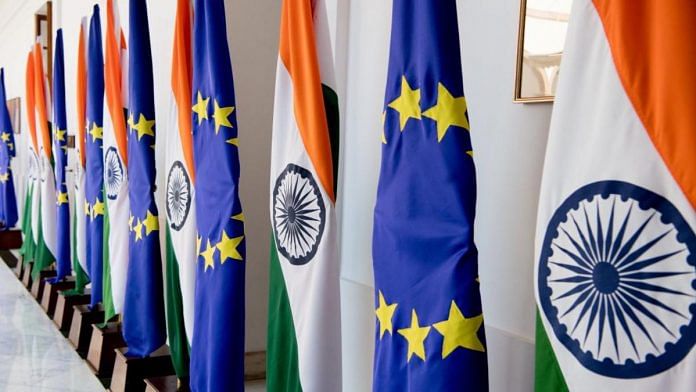One of the key roadblocks in concluding an India-EU Free Trade Agreement is the European Union demand that the pact should contain a chapter on Trade and Sustainable Development, or TSD, which requires both parties to adhere to international labour and environmental norms in the economy. Successive Indian governments have opposed this since the talks began in 2007, arguing that the TSD chapter would interfere with our sovereign right to legislate on labour and environmental issues, but there is actually nothing within it that would infringe on India’s sovereignty.
In fact, including TSD commitments in an India-European Union (EU) Free Trade Agreement (FTA) would simply require the government to incentivise Indian exporters to adopt better labour and environmental protections in their operations, differentiating them from competitors such as China and enhancing India’s attractiveness as a sourcing base for EU and other foreign importers.
India’s hesitation
The reason both the United Progressive Alliance (UPA) and National Democratic Alliance (NDA) governments have been opposed to the inclusion of a TSD chapter is because it becomes a sovereign commitment to first, improve local labour and environmental laws to meet international standards prescribed by the International Labour Organization (ILO) or the Paris Agreement, and second, ensure local exporters follow these laws, whether through better government enforcement or any other methods. Nevertheless, the reality is that all next-generation FTAs include TSD or equivalent chapters with sovereign commitments on labour rights and environmental protection.
For example, the United States-Canada-Mexico Agreement (USMCA) has specific commitments on protecting labour rights not found in any previous FTA negotiated by the parties. Similarly, the upcoming EU-Mercosur FTA will require all parties to make several commitments on environmental protection aligned to their targets under the Paris Agreement.
Consequently, if India wishes to become an integral part of the global trading rules-based order, which includes the EU, UK, and the US, accepting TSD clauses in FTAs will be non-negotiable.
Further, the proposed TSD chapter would not require India to modify our laws, particularly if it is similar to TSD chapters in EU FTAs with Vietnam, Japan, and the Mercosur countries. A TSD chapter would require India to ensure fundamental labour rights, address climate change, and comply with certain international conventions related to ecological protection. Fundamental labour rights are already guaranteed under Indian law, and we have previously announced ambitious environmental commitments under the Paris Agreement. In fact, India has already acceded to and ratified almost all international conventions that are generally covered by TSD chapters such as the CBD and CITES.
Also read: Eye on China, Modi & Johnson set 2030 target for India-UK Comprehensive Strategic Partnership
Thinking long term
Importantly, local businesses are generally wary of additional labour and environmental protections as these have a cost impact, which makes them uncompetitive to foreign buyers. But what local exporters need to understand is that consumers in foreign markets, particularly younger consumers, are becoming increasingly conscious about “how” and “where” the goods they consume are manufactured. Foreign buyers are aware of these trends, which are increasingly influencing their buying decisions.
Therefore, only those exporters will do well over the long term who proactively recognise these trends in time and can ensure that they are competitive on cost, while also providing adequate benefits to workers and safeguarding the environment. A 2018 Federation of Indian Chambers of Commerce & Industry (FICCI) survey illustrates some of the steps Indian companies can take in this area. Unfortunately, most businesses only take a short-term, financial view, forcing the government to step in to enforce laws and incentivise longer-term behavioural changes. This is where the TSD chapter can be handy as it incentivises exporters to comply with its provisions, otherwise they may lose out on the FTA’s benefits.
Better adoption of labour rights and environmental protections in local supply chains, whether through government enforcement or other incentives, will also differentiate India from competitors such as China, which still outperforms every other country on cost, quality, and time-to-market factors. However, in recent years, China is slowly losing its market share, partly due to labour and environmental violations, and partly due to rising wages and the US-China trade war. China has seen the writing on the wall and it is no surprise that its government has cracked down on polluting factories. But China’s record on labour rights remains abysmal, particularly considering the forced labour situation in Xinjiang and Tibet. This is, therefore, a great opportunity for India to differentiate itself as a much more socially and environmentally responsible manufacturing base, not just for Europe, but the world.
Also read: India doesn’t have to match climate commitments expected of China. Modi must make it clear
Respecting international norms
Other changes in EU law will also make it imperative for Indian exporters to adopt better labour and environmental protections if they want to become trusted EU suppliers, FTA or no FTA. Two upcoming EU-wide initiatives, human rights due diligence and the carbon border adjustment tax, will penalise EU companies for labour and environmental violations in their supply chains outside the EU, including in India. Therefore, Indian exporters will suffer additional costs and reputational damage if they do not adhere to international labour and environmental norms. With the EU being our largest market for key labour-intensive industries such as textile and leather, this will hinder the expansion of these industries and deliver a blow to job creation.
In conclusion, there are already many barriers to a future EU-India FTA, such as issues related to market access, intellectual property rights, digital trade, etc., that are difficult to resolve. There is no need to create an additional roadblock over the TSD issue, particularly when the Indian government should itself be advocating for better labour and environmental protections in local manufacturing to ensure better developmental outcomes for our own citizens. A TSD chapter in our future FTAs is, therefore, desirable and should not be opposed.



